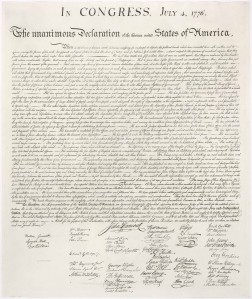Fundamentally, the Foundation’s mission is to make the nation’s health care system more responsive to the needs of its population. In our view, the growth of a population of older adults and the growing burden of chronic disease and complexity that come with them pose challenges that require us to break out of the complacency of “business as usual” in health care education/training and service delivery. Thankfully, we are not alone in this belief. Plenty of other funders stand with us. As we have talked with our colleagues about our common concerns, we have been trying to identify a set of common principles upon which we can base our work to spread innovations.
 An inspiration in this process has been the preamble to the Declaration of Independence. The preamble was a concise effort to publicly report the basic principles from which the founders derived our inherent rights to rebel against an iniquitous status quo. In this case, some of us who attended the Health Funders Forum in July have agreed to take a whack at writing a preamble to a “Declaration of Innovation in Health Care.” In the preamble, we will lay out the basic principles that must underlie our efforts to create an improved health care system that best serves the common good.
An inspiration in this process has been the preamble to the Declaration of Independence. The preamble was a concise effort to publicly report the basic principles from which the founders derived our inherent rights to rebel against an iniquitous status quo. In this case, some of us who attended the Health Funders Forum in July have agreed to take a whack at writing a preamble to a “Declaration of Innovation in Health Care.” In the preamble, we will lay out the basic principles that must underlie our efforts to create an improved health care system that best serves the common good.
Here is my effort. Let me know what you think; even Thomas Jefferson took edits. I’ve included a link to the original text so you can see the beauty of the Founders’ words and ideas, as well as how far I fall short. All I can say is that my preamble is 39 words shorter--count for yourself.
Health care is vital to the present well-being and future possibilities of our citizens and our society. Today’s health care system struggles to meet reasonable standards for quality and efficiency. The health care system and the health of the public face major challenges in demographic shifts, continuing technological advances, and a workforce mismatched to our needs. In the near future, the unsustainability of health care, as currently conceived, will undermine the economic and physical well-being of families, communities, and the nation. Change in how health care is delivered, organized, staffed, and financed is therefore an obligation, not an option. Looking into the future, improvement in the speed, reach, and judgment applied to managing change in health care is a prerequisite for all other improvements.
We believe, as the Institute of Medicine has described, there is a yawning chasm between the health care system of today and the safe, effective, patient centered, timely, efficient, and equitable system we need – and that the status quo is intolerable.
We believe that, while many innovations in health care, such as drugs and devices, are rapidly incorporated into practice, many more fundamental organizational and cultural changes are not, and that they are under-researched, under-appreciated, and under-utilized.
We believe that the special and privileged position of health care institutions and professionals is predicated upon a social compact that includes a commitment to staying current in the science and practice of health care to best serve the interests of the public.
We believe that innovators, institutions, providers, professionals, and payors (including JAHF)--the “health care system”--are jointly and severally responsible for continuous improvement in the health of the population.
To meet the current and future challenges, the health care system must not only change now, but it must become fundamentally better at the very process of change.
In the next step, a few of us will hash out a collaborative draft of this preamble to share with our Health Funders Forum colleagues. Any thoughts on the content? What should we include—or leave out? We of course hope that the “Declaration of Innovation” will be the prelude to a revolution in the way we deliver health care in America.
